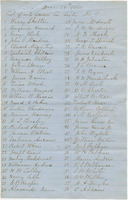-
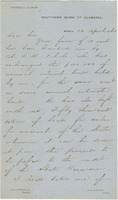
In the letter, Schroeder acknowledges receipt and exchange of state bonds.
-
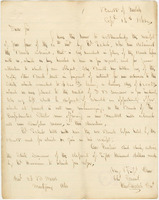
In the letter, Walsh acknowledges receipt of state bonds at the bank.
-
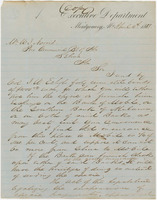
The letter concerns the sale of state bonds.
-
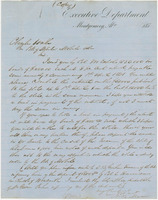
The letter concerns the sale of state bonds. A note near the end of the document indicates that an identical message was sent to H. A. Schroeder, president of the Southern Bank in Mobile.
-
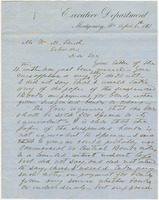
The letter contains a clarification of an earlier communication regarding the sale and purchase of state bonds.
-
Judge of Probate for Randolph County, Alabama, active during the 1860s. Affiant and witness in jail escape investigation (Jan. 1861).
-
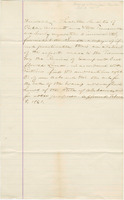
The resolutions were adopted by the Alabama Senate, and contain a request for land sale reports from the State Treasurer and the Auditor of Public Accounts.
-
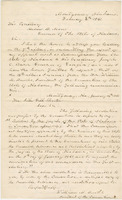
In the letter, Shorter reports on his work as Alabama's commissioner to Georgia and the Georgia Secession Convention. Enclosed is a printed broadside with writings relating to Shorter's report. (John Gill Shorter was the governor of Alabama from 1861-1863.)
-
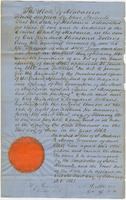
The amount loaned was one hundred thousand dollars, payable on June 1st, 1862.The note was signed by Governor A. B. Moore and W. J. Greene, the Alabama Comptroller of Public Accounts.
-
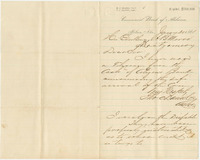
The letter confirms the safe arrival of coins shipped to the Citizens' Bank of Louisiana in New Orleans. Daniel was the cashier for the Commercial Bank of Alabama.
-
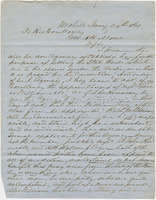
The letter concerns the appointment of agents for the sale of state bonds.
-
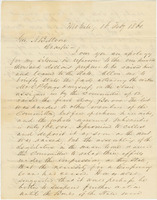
On February 10, 1861, a letter was sent to Alabama Governor A. B. Moore to inform him of the flag’s preservation, as it had been damaged by a strong storm after flying during the state’s secession on January 11. The flag was taken down to prevent further damage and delivered to the Governor to be kept as a lasting tribute to Alabama’s secession and the women of Montgomery who had presented it.
-
Levi W. Lawler writes to Governor A.B. Moore on February 16, 1861, explaining the delay in raising the $100,000 for the state's defense, noting that only $60,000 was collected due to the Legislature's assembly and the suggestion to wait for the sale of state bonds. He expresses his disappointment in the delay but reaffirms his readiness to assist in the defense and supports the secession movement, urging the border slave states to join the Confederacy.
-
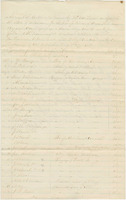
The document includes a note from Vanderveer in Montgomery, Alabama, to Governor A. B. Moore. "Account of Certificate issued by W. P. Van Derveer as Agent for the State of Alabama for the transportations of Arms, Stores and Baggage; Camp Equipage & Amunitions, over the route from Garland to the Terminus of the Alabama & Florida Rail Road & from Pensacola to Head Quarters of the 2nd Regt Vol Command by Col T Lomax & Col H D Clayton of 3rd Regt Vol"
-
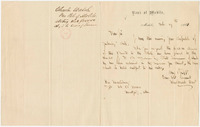
On February 19, 1861, Charles Walsh, President of the Bank of Mobile, confirmed that a $50,000 loan from the bank to the state had been placed to the credit of D. B. Graham, the State Treasurer, and that the funds were held subject to his order.
-
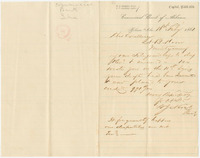
On February 16, 1861, W. J. Norris, President of the Commercial Bank of Alabama in Selma, responded to Governor A. B. Moore’s telegram, confirming the discounting of his draft and its deposit to his credit.
-
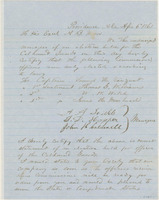
Letter from election managers in Providence, Alabama, to Governor A. B. Moore, certifying the election of officers for the Calhoun Guards.
-
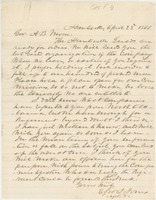
A letter requesting that guards are ready for a company located in Huntsville, Alabama. The letter also concerns the organization of the Huntsville Guards.
-
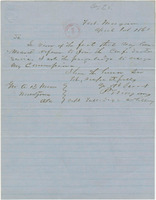
It is a resignation letter for Capt. Morgan of Talledega of Artillery due to his unit's refusal to enter Confederate service. The resignation was forward by Colonel W. J. Hardee, C.S.A., commanding officer at Fort Morgan.
-

A letter from the CSA requesting meals and rifles from Dr. Stinson. It seems they are lacking in materials.
-
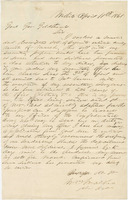
A letter desribing recruit numbers to General Goldthwaite. In the letter it discusses what materials these recruits need. Walker reports on military recruits enlisted in the month of March 1861.
-
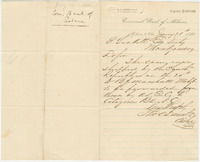
-
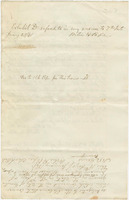
-
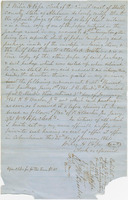
-
